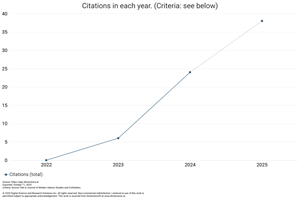Role of Da'wah in Responding to Political Dynamics in Indonesia
DOI:
https://doi.org/10.59653/jmisc.v3i02.1771Keywords:
Da'wah, Political Participation, Religious Communication, Political Awareness, Civic EngagementAbstract
This study explores the role of da'wah in responding to the dynamic political landscape in Indonesia. As a form of religious communication deeply rooted in cultural values, da'wah has the potential to shape political behavior, raise awareness, and foster inclusive participation, particularly among marginalized groups such as women. The findings indicate that da'wah serves not only as a medium for conveying moral and ethical principles but also as an instrument for political education and engagement. By utilizing both traditional and digital media, da'wah adapts to contemporary challenges and facilitates dialogue across political divides. However, the study also identifies several challenges, including the risks of misinformation, misinterpretation, and the politicization of religious messages. These issues highlight the need for da'wah practitioners to develop effective communication strategies that are contextually relevant and grounded in both religious knowledge and socio-political understanding. Innovative approaches such as philanthropic da'wah, participatory platforms, and interdisciplinary engagement are emphasized as key to enhancing the impact of da'wah in political discourse. Using a qualitative literature review method this study provides a comprehensive analysis of how da'wah can contribute to building political awareness and democratic values in Indonesia. The study concludes that with the right strategies and ethical foundations, da'wah can become a powerful tool for civic transformation and social cohesion.
Downloads
References
Alimardani, M., & Elswah, M. (2020). Online Temptations: COVID-19 and Religious Misinformation in the MENA Region. Social Media + Society, 6(3). https://doi.org/10.1177/2056305120948251
Ambarwati, R., & Damayanti, W. (2024). An Analysis of Politeness Comments by Indonesian National Team Football Players on Governor Ganjar Pranowo’s Instagram. Kne Social Sciences. https://doi.org/10.18502/kss.v9i6.15252
Aziz, M. S., Indrasari, M., Pamuji, E., Wulandari, E. R., & Prasnowo, M. A. (2022). Systematic Review: Use of Digital Media as a Means of Communication of Da’wah. Jurnal Spektrum Komunikasi, 10(2), 187–193. https://doi.org/10.37826/spektrum.v10i2.324
Barry, W. I. A., Abdellatif, M. A. M., & Moayad, H. G. (2022). Mediatization and Patterns of Social Interaction on Social Media. Global Media and Communication, 20(2), 237–252. https://doi.org/10.1177/17427665221135094
Djuyandi, Y. (2017). Political Communication Strategy of the Regional Head in Managing Government in North Gorontalo Regency. Jurnal Bina Praja, 9(1), 53–61. https://doi.org/10.21787/jbp.09.2017.53-61
Istikhomah, F., Istighfarin, A., Al-Kubro, P. B., Ibrahim, M., & Shobri, M. Q. (2024). Pengembangan Metode Komunikasi Dakwah Tabligh Komunitas Life Is Right Dalam Membentuk Karakter Pancasila Pada Anak. Jurnal Audiens, 5(1), 140–151. https://doi.org/10.18196/jas.v5i1.348
Jima’ain, M. T. A. (2023). Dawah in the Digital Age: Utilizing Social Media for the Spread of Islamic Teachings. 1(1), 1–7. https://doi.org/10.15575/jcspi.v1i1.444
Mahmud, M. (2019). The Use of Politeness Strategies in the Classroom Context by English University Students. Indonesian Journal of Applied Linguistics, 8(3), 597. https://doi.org/10.17509/ijal.v8i3.15258
Marlina, M., & Ulya, Y. A. (2024). Communication Strategies in Islamic Da’wah Opportunities and Challenges in the Era of Artificial Intelligence. 1(2), 121–130. https://doi.org/10.62569/fijc.v1i2.35
Maros, M., & Rosli, L. (2017). Politeness Strategies in Twitter Updates of Female English Language Studies Malaysian Undergraduates. 3l the Southeast Asian Journal of English Language Studies, 23(1), 132–149. https://doi.org/10.17576/3l-2017-2301-10
Meiratnasari, A., Wijayanto, A., & Suparno, S. (2020). The Teacher’s Perspective on the Impact of Politeness Strategies in the Indonesian English Textbook on Student’s Communicative Competence. Issues in Language Studies, 9(1), 166–178. https://doi.org/10.33736/ils.1807.2020
Munthe, M. (2019). Penggunaan Radio Sebagai Media Komunikasi Dakwah. Jurnal Komunika Islamika Jurnal Ilmu Komunikasi Dan Kajian Islam, 5(2). https://doi.org/10.37064/jki.v5i2.3993
Muyassaroh, I. S., Harto, U. S., Suparto, D., Permadi, D., & Sutjiatmi, S. (2024). Model Komunikasi Pendakwah Pada Konten Dakwah Dalam Isu Sosial Dan Politik Di Media Sosial. Syntax Literate Jurnal Ilmiah Indonesia, 9(4), 2231–2241. https://doi.org/10.36418/syntax-literate.v9i4.15480
Putrawan, A. D. (2021). Menakar Sejarah Pemikiran Dakwah Era Nabi Ulul ‘Azmi. 2(1), 1–16. https://doi.org/10.20414/mudabbir.v2i1.3413
Siregar, S. F., Dewi, M., & Akbar, A. (2023). Pengaruh Karakteristik Individu dan Karakteristik Pekerjaan terhadap Motivasi Kerja Perawat Rumah Sakit Umum Haji Medan. Regress Journalof Economic & Management, 2(3), 1–10.
Sudiansyah, A. (2017). Efektivitas Komunikasi Dakwah Di Pesantren MQ Dalam Merubah Akhlak Santri. Communicatus Jurnal Ilmu Komunikasi, 1(2), 139–154. https://doi.org/10.15575/cjik.v1i2.4842
Suharto, S. (2017). Urgensi Komunikasi Politik Dakwah. Al-Mishbah | Jurnal Ilmu Dakwah Dan Komunikasi, 9(2), 181. https://doi.org/10.24239/al-mishbah.vol9.iss2.26
Tajiri, H. (2010). Ikhtiar Mengembangkan Performance Dakwah Hasanah Dari Perspektif Etika Dakwah. Anida (Aktualisasi Nuansa Ilmu Dakwah), 9(1). https://doi.org/10.15575/anida.v9i1.584
Xia, X., Zheng, B., & Feng, D. (2020). Interpreting Impoliteness and Over-Politeness: An Investigation Into Interpreters’ Cognitive Effort, Coping Strategies and Their Effects. Journal of Pragmatics, 169, 231–244. https://doi.org/10.1016/j.pragma.2020.09.021
Downloads
Published
How to Cite
Issue
Section
License
Copyright (c) 2025 Hamdi Maulana Hasibuan, Hasan Sazali, Retno Sayekti

This work is licensed under a Creative Commons Attribution-ShareAlike 4.0 International License.
Authors who publish with this journal agree to the following terms:
- Authors retain copyright and grant the journal right of first publication with the work simultaneously licensed under a Creative Commons Attribution-ShareAlike that allows others to share the work with an acknowledgement of the work's authorship and initial publication in this journal.
- Authors are able to enter into separate, additional contractual arrangements for the non-exclusive distribution of the journal's published version of the work (e.g., post it to an institutional repository or publish it in a book), with an acknowledgement of its initial publication in this journal.
- Authors are permitted and encouraged to post their work online (e.g., in institutional repositories or on their website) prior to and during the submission process, as it can lead to productive exchanges, as well as earlier and greater citation of published work (See The Effect of Open Access).
























